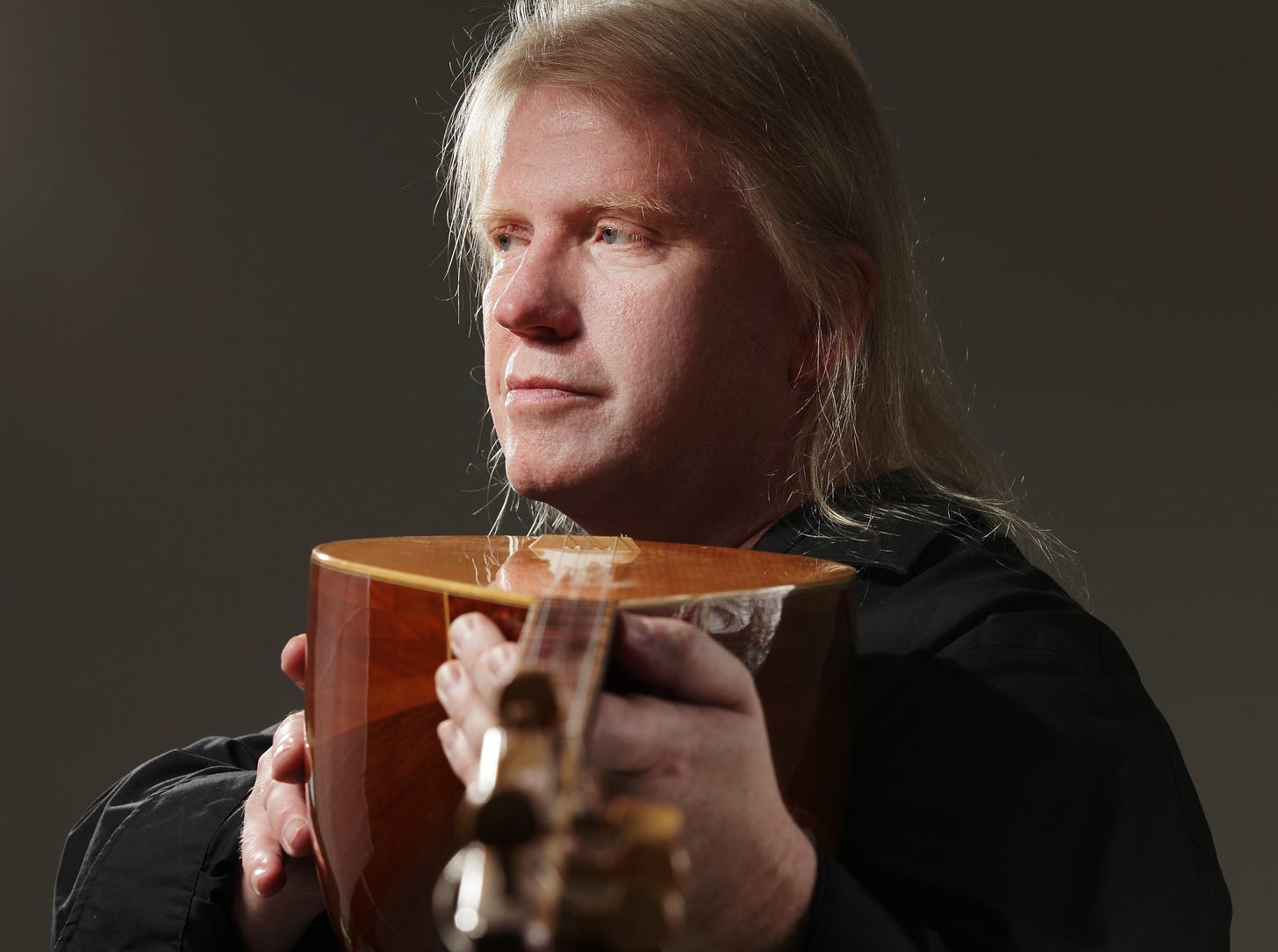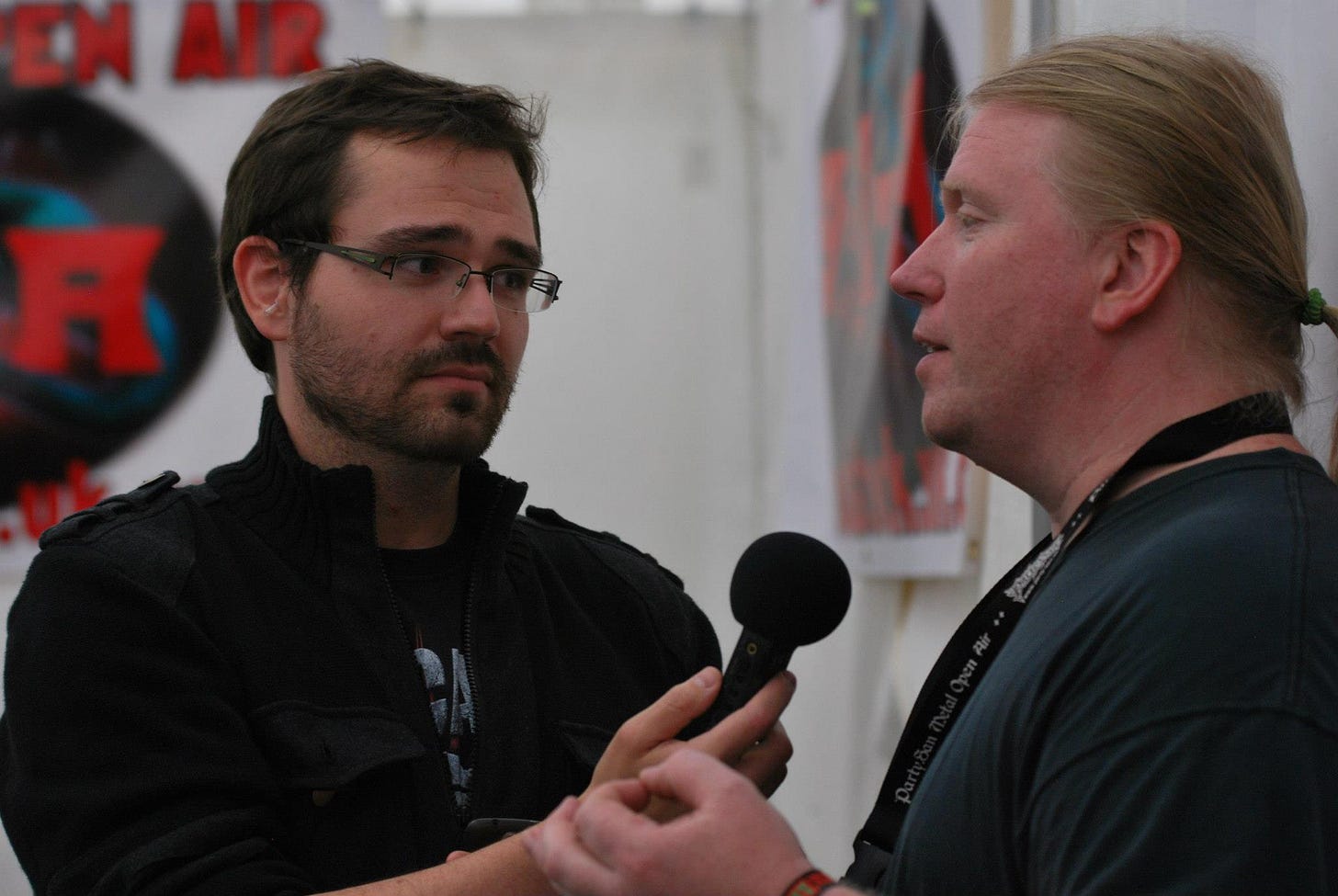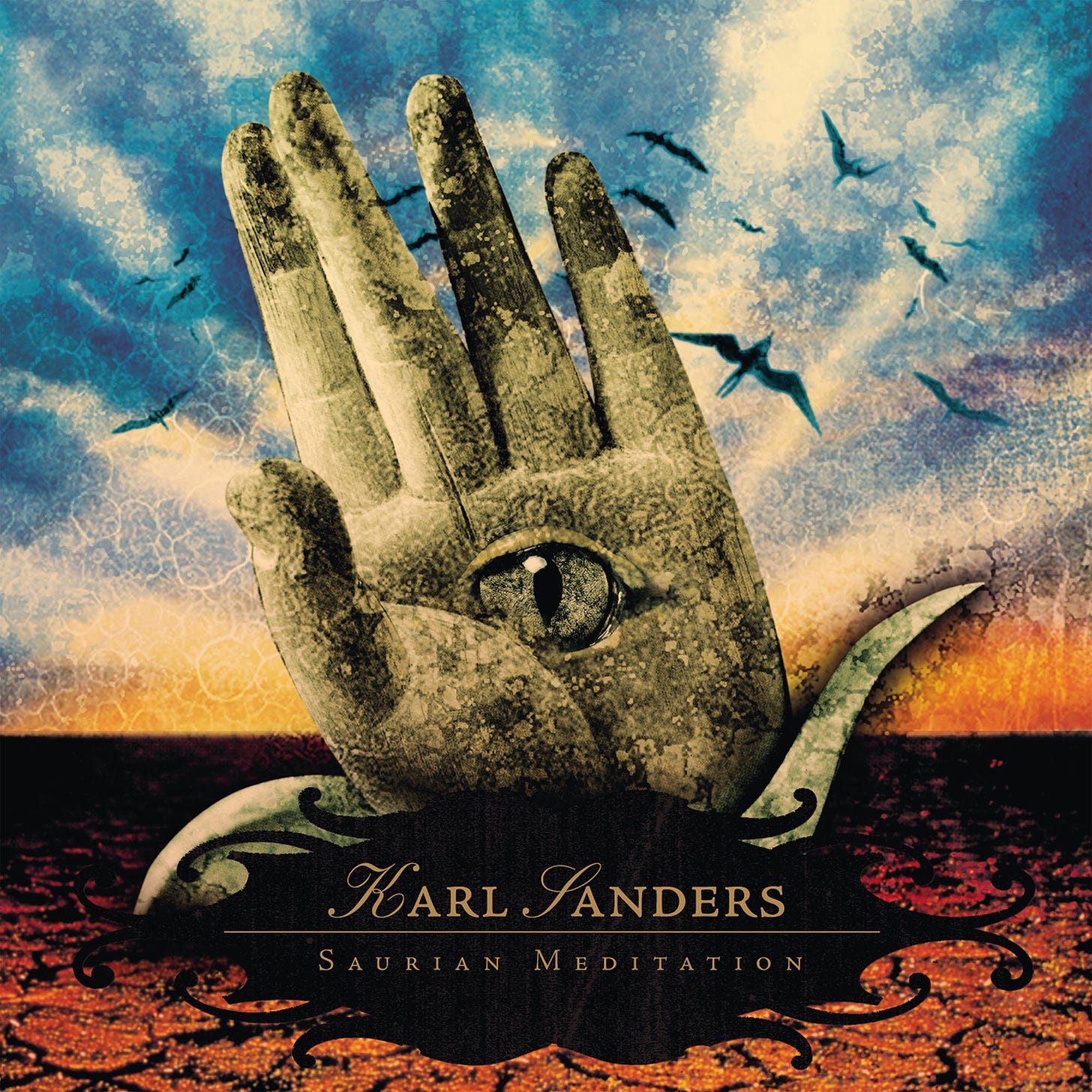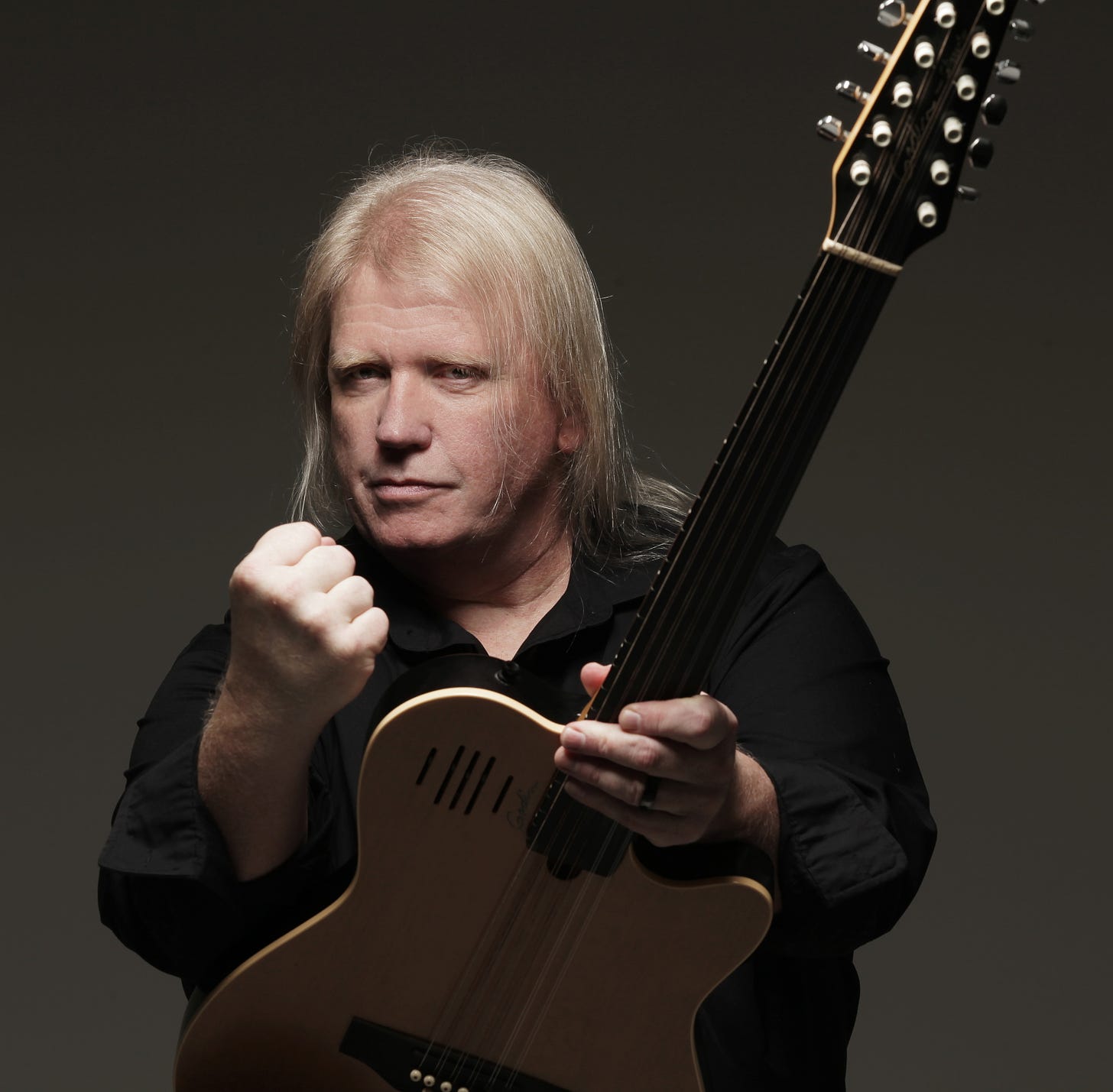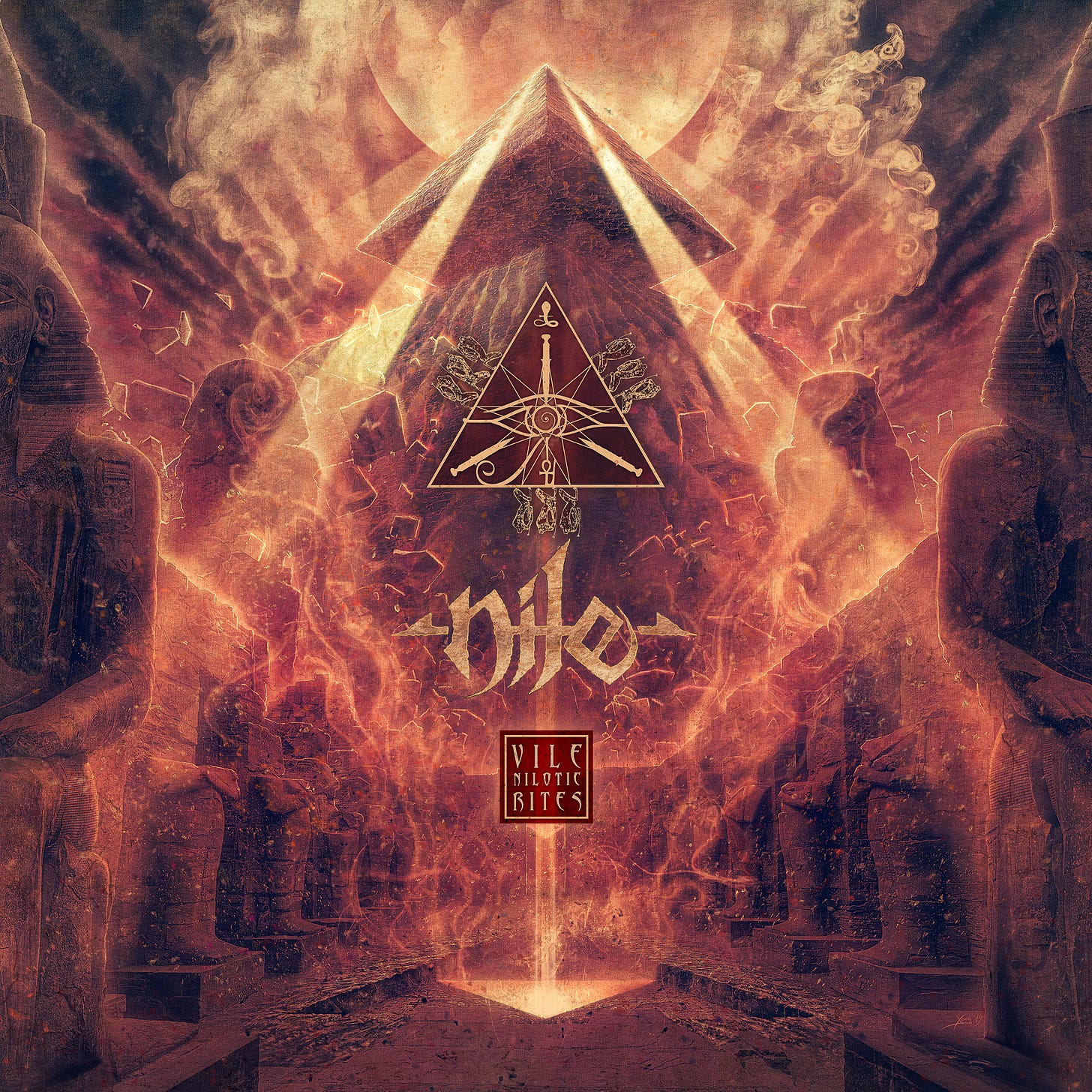"I want to make music for reptiles and crocodiles to fucking meditate to."
Since nowadays I make several videos per month, it might come as a surprise that I used to be extremely camera-shy. In fact, when I first started interviewing people, I would not even appear on the frame. Karl Sanders forced me to stop that.
I first met him back in 2012 at Bloodstock Open Air in the UK. He refused to do the interview on video unless I was also in the frame. I guess I could have just said “well, fuck it, let’s just do it as audio-only”, but at the time I thought the only option was to just let myself be recorded. You can still see it on Youtube, and marvel at how absolutely awkward I was am .
The great thing about Karl is that he’s, by far, one of my favorite people to interview. He’s funny, down to earth, and quick to laugh. And considering that he’s one of the most talented and influential death metal guitarists out there, the fact that he’s so chill about the whole thing makes interviewing him an absolute pleasure.
Now, even though most people know Karl because of his work with Nile, I first found out about him because of his solo work in Saurian Meditation and Saurian Exorcism. I was immediately hooked by the creepy atmosphere that he had created, and was really surprised when I found out that he was also involved in a death metal band.
Karl recently released Saurian Apocalypse, his third solo album, and I knew that I had to meet with him to discuss it. Turns out the whole thing was just a way to make alligators meditate. And who knows; maybe it works.
You can watch my interview in the video below, or read the transcript.
JS: The last couple of years have been pretty rough for musicians, so how have you been?
Karl: All of us who play music, or are involved in music in any way, had to find other ways to make a living for the last two years. Nobody who worked in the concert industry had any work either, so we all had to do other things in order to survive.
I was lucky enough that I got to teach guitar. That's how I survived. But it was really great, because I was interacting with so many metal guitar players. It was a great learning experience for me, so I was happy. I was busy, but I was fucking happy.
The amount of guitar playing I've done in the last two years... Well, there was nothing else to do [laughs] so I put it to good use.
JS: I teach at a university, and it has changed a lot of my own understanding of things, since it forced me to not only know how to do something, but also know how to convey it to other people so that they understand. How was this experience for you?
Karl: That "conveyance" that you are talking about, our own understanding of whatever it is we're teaching, is heightened and deepened when we teach. Because in order to explain it to a student in a way that conveys the essence, and communicates what it is, you have to codify it in your mind. You have to be able to understand it in in a way that’s “frameable” in verbal language. So, right away, in your own mind, all of these connections are firing, and you understand it from multiple angles. You start seeing it from a whole lot of perspectives, so that each time you have to re-explain it, you understand it more.
It's the same with doing martial arts, because as soon as you get your first black beltyou're expected to also instruct the younger students. And they say wisdom always starts with the first black belt. And when you get that first black belt you understand that you know almost nothing, which is a mind fuck. You strap on your first black belt and you think you've achieved something-
JS: Karl I think this is the third time that I interview you and every single time you’ve managed to work in the fact that you have a black belt in martial arts. Every time you say something along the lines of "you know, by the way... I can kick your ass" [laughs]
Karl: But you should have already been able to tell that! [laughs]
You know, if I can figure out a way to get paid for working that in, that would be good. But, really, I'm just trying to show how I understand things, to relate it to it.
When I'm teaching guitar students and I'm trying to explain something, it helps me understand it in new ways. And I've found that by having this higher number of students, I was the hub at the center of a big wheel with a lot of spokes. And I was seeing lots of players, each of whom has their own way of doing things and their own understanding of the instrument. So it's an exponential increase in understanding what I was already trying to do anyway. So the benefits for the person teaching are as great or greater than it is for the students. It's crazy how it works.
JS: And what level do your students tend to be?
Karl: Advanced to intermediate players, guys who are already good. And some of these guys are frankly better guitar players than I am as far as their capacity to do stuff.
I mean, we're living in the modern age of YouTube university. Younger players now have access to so much top quality instruction. And you can see your heroes! If you want to see how Steve Vai does something, you just Google Steve Vai, and you get 150 videos where you can watch how Steve Vai does whatever it is Steve Vai does. That was a thing you couldn't even conceive of when I started playing. We didn't have the Internet!
JS: Your first album with Nile was already back in 98 and already in 2004 you released your first solo record, Saurian Meditation. Take me back to that time. Why did you want to create a solo project, and what were your aims with it? Because it is so different from what you were doing already.
Karl: Well, back then we were we were doing a lot of touring to support the first couple of records, and we were a support act. This meant that we were at the bottom of the bill, meaning that every day on tour we were listening not just to our own stuff, but also every other band on the tour, all day long.
As a person who loves metal, that's great. Metal all day long, every day. It's great. I love it. But after a while, once in a while I need some peace and quiet; I need to be able to hear myself think. So that's what the music on the first Saurian record was.
It wasn't even a record when it started. It was just something to do in between tours. I would go home and play some music that I liked, that wasn't loud, that was quiet, so I could chill out. During one of our tours, we stopped in Lancaster, Pennsylvania, where Relapse had a big facility. I asked Matt (Jacobson, founder of Relapse Records), if I could use their space to practice and work on some music. He heard it and told me that I had to share it with people since they would love it, so that I couldn’t keep it to myself. That's where Saurian Meditation came from.
JS: Tell me a little bit about the Saurian concept.
Karl: When I was writing the stuff that was on Saurian Meditation, the first Saurian album, I was really fond of taking my kid to alligator and crocodile farms. They’re just a big farm where they have alligators and crocodiles in their natural habitat, and there was one where you could even feed the crocodiles.
It was amazing. They would open the gates next to the lake at the same time every day, so the alligators and crocodiles all knew when to show up at the gate for feeding time. And there would be a guy with a wheelbarrow full of raw steaks, big steaks cut huge. And for $20, you could stand at the wheelbarrow and toss steaks to the alligators, so they would come up like two feet from you. And there were 20 or 30 of them, all there, piled up with their mouths open going "Hey, throw me the steak!". But you're an arm's length from them. That will raise every primordial hair on the back of your neck like nothing else. You are literally at the mercy of apex predators that would eat you just like that. It's super fun.
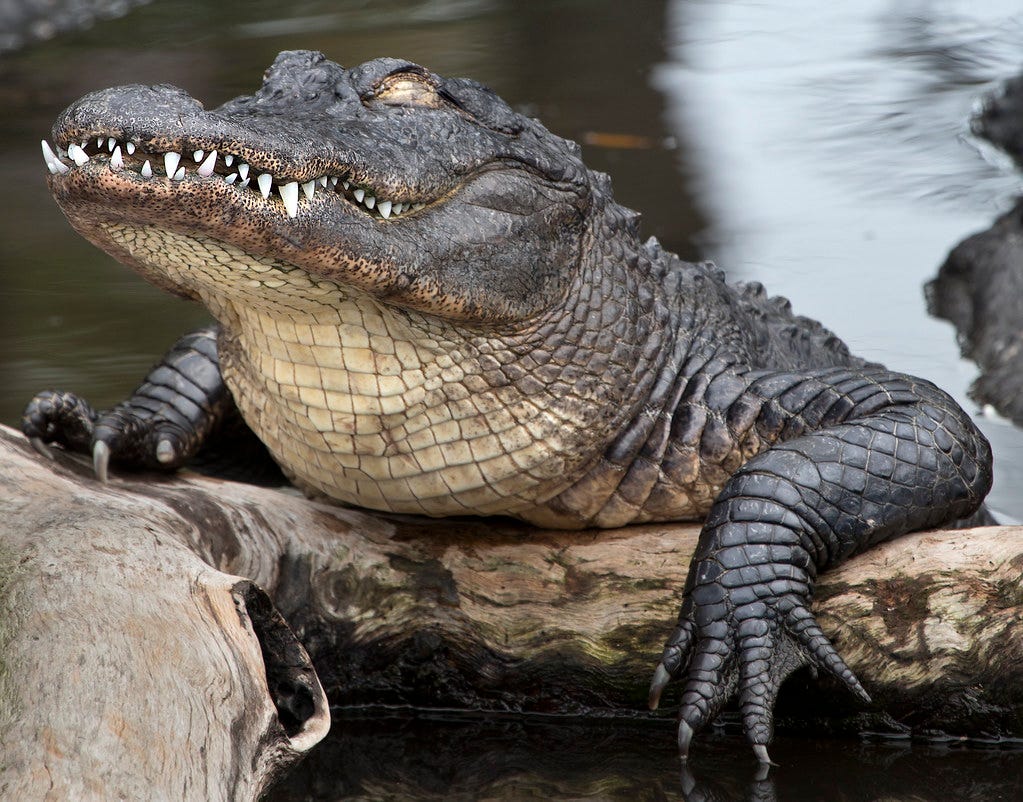
I also noticed the places where the alligators and crocodiles were at rest, just laying there basking in the sun or floating in the water. And you're up close to them, so you can see in their eyes. There are a lot of times where it looks like you're staring into the eyes of these creatures that aren't there. I mean, they are there, but it's like only their bodies are there, and their souls and minds have gone somewhere else. To another dimension or something. Those eyes are deep, man. Those cold reptile eyes.
So I started to wonder "what the fuck are these guys thinking about? Are they dreaming with their eyes open? Are they traveling outside their bodies? Is this transcendental meditation of some sort? What the fuck are these guys doing?!” And those questions kind of led me to "All right, I want to make music for reptiles and crocodiles to fucking meditate to."
It was awesome, you know? It’s music that kind of puts me to sleep. At the time my son was a young kid, he was less than ten years old, so getting him to fall asleep every night was a big fucking deal, because if he's up, I can't work on music. I needed him to go to sleep so I could work on music.
JS: I have a hard time imagining that you had your ten year old kid falling asleep to Saurian Meditation. It's not exactly a lullaby.
Karl: He did fall asleep to Saurian Meditation! That kid can sleep now to every Nile album since Black Seeds of Vengeance. My studio is right next to where he sleeps, and during the early years, when I had a day job, the time to write songs was when everybody went to sleep. I'd stay up late since that was when I had time to do something.
JS: Tell me a bit about the story that you tell in Saurian Apocalypse.
Karl: As I was writing the songs for this album, I also kind of saw it like a movie. Each one of the songs has parts of the story. As I was coming up with it, it started becoming more than just song lyrics or liner notes. I envisioned it like a book, so I actually started working on it.
I already did two drafts, and I'll probably finish it up after the next Nile record.
It's a lot of fun. I noticed right away that writing is actually a whole other skill set. I might be really good at writing metal songs, but that does not necessarily all transfer over. There are a lot of ways in which I'm an inexperienced writer, so there’s a whole learning curve of noticing something sucks and throwing it out.
JS: When it comes to writing music you always get to run it by your band members. How does it work when you write? Do you show it to your wife or to your friends?
Karl: My wife is a writer (she writes just for fun), and she was extremely helpful. In fact, she helped write some of it. That was pretty cool, because she's obviously not afraid to tell me that something doesn’t make any sense or that something is bad. She can be pretty ruthless
JS: In the press package that I received from your label, they say that this new album means that "the Saurian series finally ceases." Is that true, or just PR BS that they added to create the image of a trilogy?
Karl: Well, I think you said that better than I would be allowed to [laughs] I don't know that it's over, and the surest way to get me to do something is to tell me that I can't do it. I have a very rebellious streak, so if you tell me that I can't do another one, I will do another one, one way or another.
JS: What instruments did you play in this album?
Karl: The Bağlama, which is a long necked Turkish lute. It's got seven strings and three courses. There's the Glissentar, an 11 string fretless instrument made for guitarists to easily have Oud-type sounds. There's also the seven string acoustic, a 12 string acoustic, and a variety of eastern percussion stuff.
JS: I was recently talking with Michael Romeo of Symphony X, who also added some oud into his latest album, War of the Worlds. And when I asked him how he got started on that instrument, he said that "if it has strings, I can probably work with it"
Karl: Exactly! If it's got strings, you're pressing a note to a fretboard with one hand, and with the other one you're either using a pick or your fingers. And that's all guitar skills. If you've been playing guitar for 20, 30, 40 years or, in my case, 50 years, then a lot of that just works over to what other stringed instrument it is with only a little bit of adjustment.
The Bağlama is different in that it has 17 notes per octave. There are some micro tones in there, meaning that there are more notes, so you get more notes to work with… or more notes to get wrong, however you want to look at it.
JS: Were any instruments that proved to be more challenging?
Karl: The fretless has a lot of challenges because it doesn't have frets, so your intonation starts to really, really matter. There’s a whole new level of discipline that you've got to have with your technique, since otherwise all the notes sound awful.
One of the tracks on this new record, "Divergence: The long awaited Primordial Ascension" has the fretless but played really, really slowly, and that's actually hard. Harder than playing it fast, because when you're going fast, there's not as much spacing between the notes, so that there’s not as much time for the listeners to hear the pitch of the note because it goes by really quickly. But when they're slow notes there's a lot of time and space to hear the note being wrong, so you better play it right.
It's a supremely difficult thing to play that slow on a fretless instrument. And it has to be in tune because the other instruments have accurate pitches and they're an immediate reference for something being wrong. Have you ever noticed how, when people teach voice, they use a piano? That’s because the piano is pure, so that if you hit the note, you can be sure that that’s the note; it's an absolute reference. In the same way, if you've got some keyboard instruments in the background while you're playing a fretless guitar, there's an immediate reference for whoever is listening to hear whether your pitch is accurate or not. It ups the challenge.
In many oud records you're basically hearing the oud with a bunch of nice reverb and very little else, maybe a hand drum or something. This means that the little tiny pitch fluctuations don't matter as much. But as soon as you stick a keyboard instrument in there, you better be on pitch!
JS: Your last Saurian album was back in 2009, that’s 13 years ago. What caused this big gap? I imagine that it is just the fact that Nile does take quite a bit of time.
Karl: Quite a bit of time and energy. If I'm going to write something, then it's something I think about and where I'm putting all of my mental energy, not just when the guitar is physically in my hands. It’s all day, even when I'm sleeping ideas are still coming to me. If I'm mowing the lawn, if I'm walking the dog, if I'm playing tennis; whatever the fuck it is I'm doing, my brain is still on whatever it is I'm writing.
During those years, Nile consumed 20 hours a day of my brain, especially with some of the drama we had going on, so it wasn't appropriate to take my attention off of Nile when it really needed my attention.
JS: Since I can’t finish the interview without asking about Nile… Your last album was in 2019, Vile Nilotic Rites. When's that follow up coming out?
Karl: We're working on it now. We're still in the writing phase, but we're about done. I've got 11 songs on my war board. I think we're going to do 13. We're going to start recording drums in October in Greece, in George (Kolia)'s place.
I haven't been to Greece in years, so it's going to be fun. I'm really looking forward to that.



